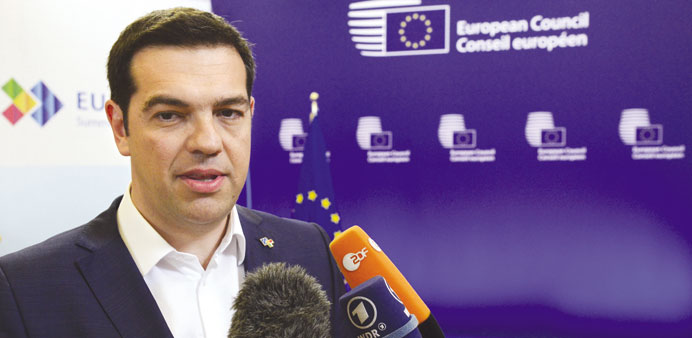Greek Prime Minister Alexis Tsipras addresses reporters after his meeting with EU Commission President at the European Union headquarters in Brussels. EU officials revealed yesterday that they had held their first formal talks on the worst-case scenario for Greece.
Reuters/Athens/Brussels
EU officials revealed yesterday that they had held their first formal talks on the worst-case scenario for Greece, but the darkening outlook failed to fluster Prime Minister Alexis Tsipras, who holed up with his negotiators after proclaiming his optimism at an open air concert.
No one knows, least of all in Athens or Brussels, whether the anti-austerity government can reach a deal with its international lenders before an end-June deadline to avoid putting the country in grave danger of crashing out of the eurozone.
But senior European Union officials are taking no chances, and have discussed a series of scenarios, several officials told Reuters. These included a potential Greek default on a €1.6bn payment to the International Monetary Fund, the global lender of last resort, at the end of this month, they said.
While Europe let loose a barrage of warnings, the leftist Greek government exuded calm and optimism. A cheerful Tsipras was mobbed by supporters late on Thursday at an open air concert to celebrate the reopening of a TV station, still wearing the blue suit he had worn at crisis talks that morning in Brussels.
His boisterous mood belied his tough talks with German Chancellor Angela Merkel and French President Francois Hollande on Wednesday, and European Commission President Jean-Claude Juncker on Thursday. Juncker jokingly called the meeting hall a “torture room”.
The failure to break a stalemate over a cash-for-reforms deal prompted the IMF to withdraw its team of experts. It also convinced EU officials holding scenario planning at a meeting in Bratislava to brace for the worst. Government representatives, preparing next week’s Eurogroup meeting of eurozone finance ministers, concluded in the Slovak capital that there were three scenarios, and that the best of them, reaching a deal next week, was now the least likely.
The second scenario was a further extension of Greece’s current bailout programme, which expires this month at the same time as Greece must repay €1.6bn to the IMF. The third – discussed formally for the first time at such a senior level in the EU – was to accept that Greece could default. The meeting reached no decision or concrete conclusion, the officials said. Most officials argued it was unlikely that creditors, which include the European Central Bank, would strike a deal on reforms with Athens in time to disburse €7.2bn still available under a rescue programme extended in February for four months.
“It would require progress in a matter of days that has not been possible in weeks. The reaction of the ECB, the IMF and several member states was extremely sceptical,” one official familiar with the discussions said.
The Greek representative at the meeting said Athens would do everything to reach a deal in time, other officials said. That would in effect mean an agreement in time to be endorsed by the Eurogroup when it meets in Luxembourg late on June 18.
German Chancellor Angela Merkel urged Greece and its creditors on Friday to keep pushing for a deal.
“Where there’s a will there’s a way but the will has to come from all sides so it’s important that we keep speaking with each other,” she told a conference in Berlin.
Tsipras’s government was elected in February on a platform to reject the austerity policies it says have worsened one of the deepest economic depressions in modern times. It says it wants a deal with creditors that would keep Greece in the euro zone, but not at a cost of violating “red lines” such as deeper cuts to pensions and workers’ rights. Thursday’s walkout by IMF experts gave Athens one area of common cause with its European creditors.
“The non-participation of the IMF in the political negotiation amounts to nothing more than putting pressure on everyone - the Commission, the ECB, Greece,” a Greek official said. “It is piling pressure in all directions – especially Berlin - with the aim of implementing tough policies in Greece in order to secure its money.”

